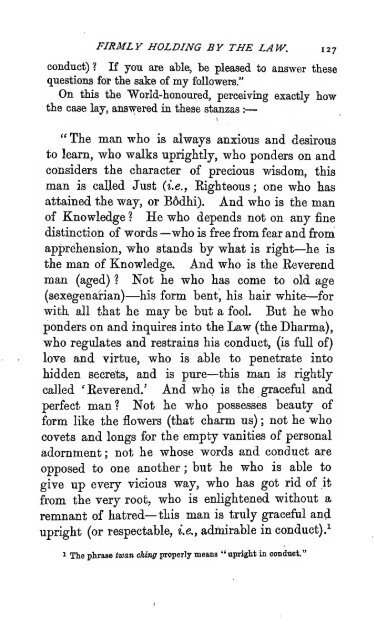Texts from the Buddhist canon : commonly known as Dhammapada
Texts from the Buddhist canon : commonly known as Dhammapada
Texts from the Buddhist canon : commonly known as Dhammapada
You also want an ePaper? Increase the reach of your titles
YUMPU automatically turns print PDFs into web optimized ePapers that Google loves.
FIRMLY HOLDING BY THE LAW. 127<br />
conduct) ? If you are able, be ple<strong>as</strong>ed to answer <strong>the</strong>se<br />
questions for <strong>the</strong> sake of my followers."<br />
On this <strong>the</strong> World-honoured, perceiving exactly how<br />
<strong>the</strong> c<strong>as</strong>e lay, answered in <strong>the</strong>se stanz<strong>as</strong> :<br />
" The man who is always anxious and desirous<br />
to learn, who walks uprightly, who ponders on and<br />
considers <strong>the</strong> character of precious wisdom, this<br />
man is called Just (i.e., Righteous; one who h<strong>as</strong><br />
attained <strong>the</strong> way, or B6dhi). And who is <strong>the</strong> man<br />
of Knowledge ? He who depends not on any fine<br />
distinction of words —who is free <strong>from</strong> fear and <strong>from</strong><br />
apprehension, who stands by what is right—he is<br />
<strong>the</strong> man of Knowledge. And who is <strong>the</strong> Eeverend<br />
man (aged) ? Not he who h<strong>as</strong> come to old age<br />
(sexegenairian)— ^his form bent, his hair white—for<br />
with all that he may be but a fool. But he who<br />
ponders on and inquires into <strong>the</strong> Law (<strong>the</strong> Dharnla),<br />
who regulates and restrains his conduct, (is full of)<br />
love and virtue, who is able to penetrate into<br />
hidden secrets, and is pure—this man is rightly<br />
called ' Eeverend,' And who is <strong>the</strong> graceful and<br />
perfect man? Not he who possesses beauty of<br />
form like <strong>the</strong> flowers (that charm us) ; not he who<br />
covets and longs for <strong>the</strong> empty vanities of personal<br />
adornment; not he whose words and conduct are<br />
opposed to one ano<strong>the</strong>r ; but he who is able to<br />
give up every vicious way, who h<strong>as</strong> got rid of it<br />
<strong>from</strong> <strong>the</strong> very root, who is enlightened without a<br />
remnant of hatred— this man is truly graceful and<br />
upright (or respectable, i.e., admirable in conduct).^<br />
1 The phr<strong>as</strong>e tvjan eking properly means "upright in conduct."<br />
—





